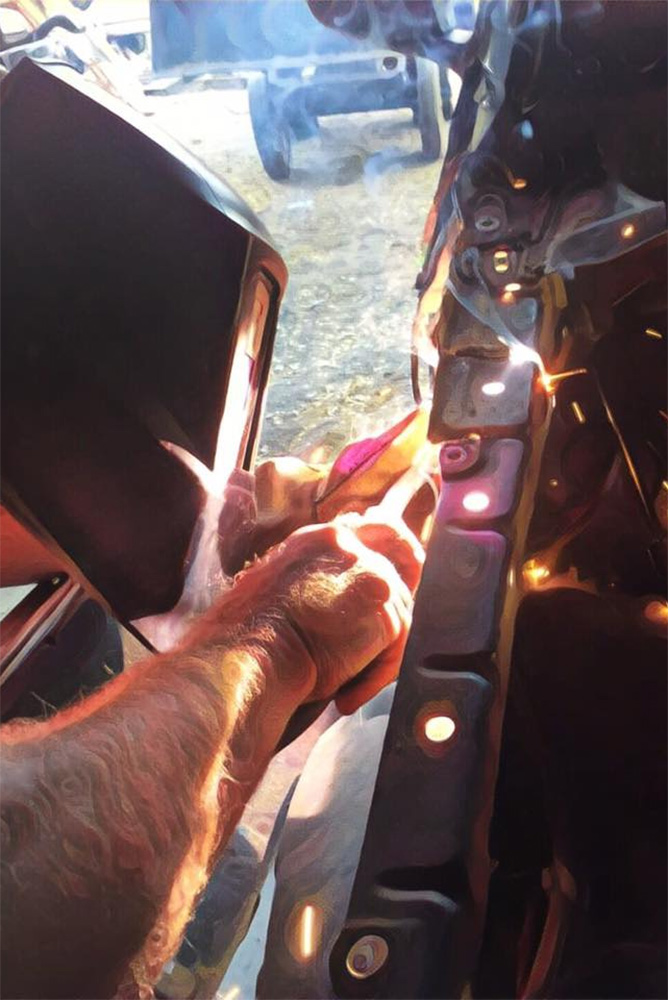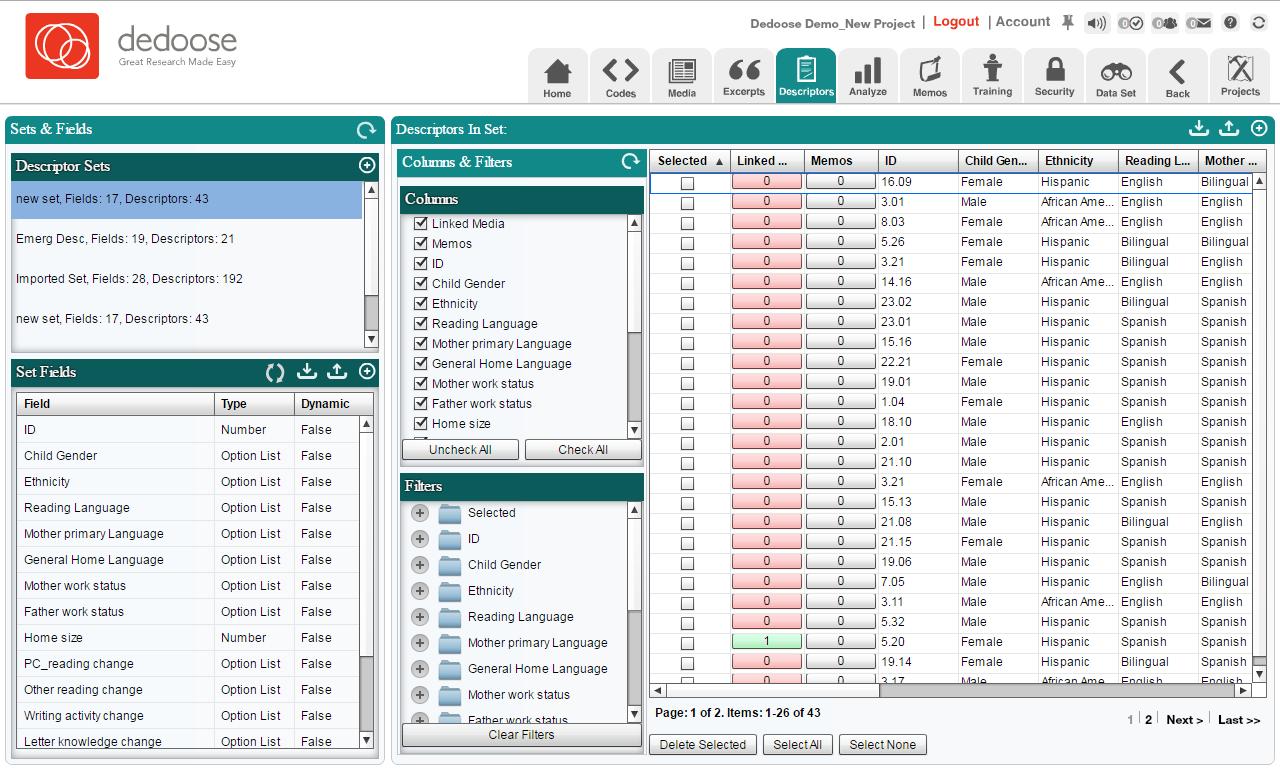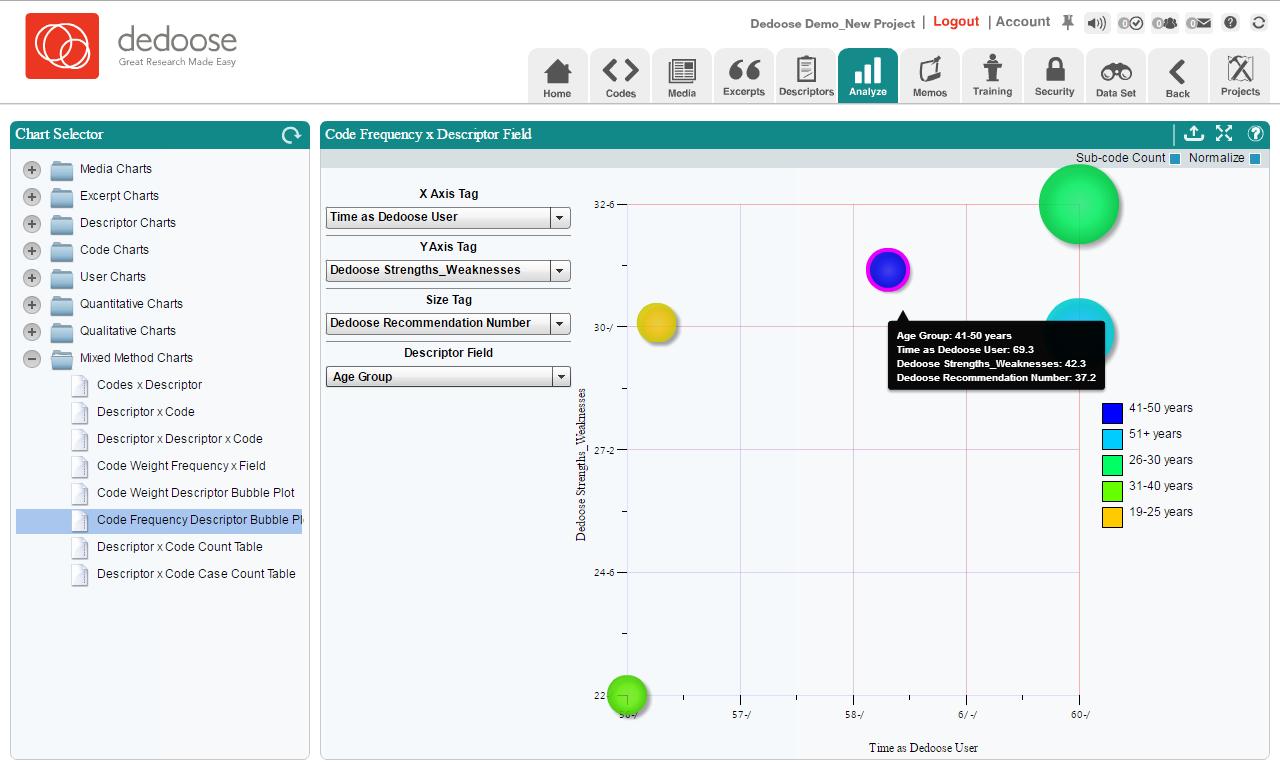Dedoose is a product of SocioCultural Research Consultants, LLC
We thank Eli Lieber for his input on these pages.
Dedoose is a web-based application designed for individual work or synchronous collaborative research from different sites; it provides a range of mixed methods tools for the handling of text, spreadsheet data and video. A series of workspaces allows coding, retrievals and memoing and a wide range of charts enable quantitative visualisation of findings if required. A subscription fee for access to the service for particular periods of time provides a flexible payment model.
From the very beginning, Dedoose was designed to deal with both numeric and qualitative data—truly a mixed methods design and mission. Dedoose is a web-based program that helps you organize research data in a wide variety of formats including qualitative data such as text, audio, images, or video; and quantitative data such as spreadsheets, surveys, test scores, ratings or demographics. Dedoose will function on Windows, Apple, and some Linux machines. Dedoose is a platform that allows users to analyze qualitative and mixed-methods research with text, photos, audio, videos, spreadsheet data and more. Users can create and modify 'codes' to tag various stages of their methodology and organize research procedures. Descriptor fields allow users to collect information describing data sources. Sep 01, 2009 Traditionally, focus group research is “a way of collecting qualitative data, which—essentially—involves engaging a small number of people in an informal group discussion (or discussions), ‘focused’ around a particular topic or set of issues” (Wilkinson, 2004, p.
As you will see in the subsequent pages – there are various types of data which can be imported and some of them are auto-processed as they are imported.
- You can create an empty project and later import data
- You can import a spreadsheet of mixed quantitative and qualitative data and the software auto-processes the information on import.
Eli Lieber gets started with a general overview processes of creating an account in Dedoose then a description of the building blocks of setting up a project. More detailed step by step instructions for each of those building blocks follows in later sections.
Dedoose App
The step by step sections are not always oriented to specific case study data, but you can experiment with any of the textual or spreadsheet data supplied in any of the 3 sample case studies. Get started!
In Chapter 5 to help get you started, we talk about productive things you can do in the early stages of setting up a ‘project’ in software. Experimenting with these processes where relevant in your chosen software will help to become familiar with useful entities in the software. We keep the subject matter of other chapters in mind as the step by step tasks get deeper into the interpretive and interrogation processes of analysing different media. Varied approaches to qualitative data analysis inform how we discuss the functions of software.
http://www.dedoose.com/
If you need further tutorial support
http://userguide.dedoose.com/

The Odum Institute provides ongoing consulting services and short courses on qualitative research and related software. Qualitative research is a social scientific method for collecting textual, visual, or audio data.
Consultations & Guest Lectures
CONSULTATIONS
If you have questions regarding research design, data collection, strategies for analysis, and options for reporting findings, please contact Paul Mihas using the information provided below. Paul can also provide consultations on deductive, inductive, and abductive perspectives that inform qualitative research.
Paul can help you through any of the stages of your project, including the early stages of developing research questions and proposal writing, such as: Designing a study, data collection, analysis, developing research products.

Paul Mihas
Assistant Director for Education and Qualitative Methods
919-962-0513
paul_mihas@unc.edu

GUEST LECTURES
Time permitting, Paul is also available to give guest lectures on various qualitative research topics at classes and meetings. If you would like to schedule a guest lecture on a qualitative research topic, please contact Paul Mihas directly or visit our guest lecture page.
Qualitative Research Traditions
The Odum qualitative research consultant, Paul Mihas, can also provide resources for researchers using a specific research tradition. If you would like to discuss different approaches to qualitative analysis, he can meet with you regarding the following traditions:
- Generic qualitative
- Thematic qualitative research
- Phenomenology
- Ethnography
Mixed Methods
Paul can also assist if you are conducting a study combining or connecting qualitative and quantitative data. Please visit our mixed methods page for more information.
Project Planning, Data Collection and Analysis
As part of a fee-based service, the Odum Institute offers project-based design and analysis using strategies customized for each project’s needs. These range from evaluation projects to multi-year research studies. Assistant Director Paul Mihas, with the assistance of graduate students, can help with:
- Research design
- Developing interview and focus group guides
- Conducting data collection
- Data analysis using specialized software
- Final reports

Dissertation & Master’s Thesis Assistance
If you would like Paul Mihas to provide feedback regarding a master’s thesis or dissertation proposal or draft of a chapter, please feel free to contact him at paul_mihas@unc.edu.
Dedoose Vs Nvivo
Qualitative Data Analysis Software
The Odum Institute provides specialized computer programs that provide tools for mixed methods analyses; these include QSR NVivo, ATLAS.ti, MAXQDA, and a web-based program, Dedoose.
Odum offers short courses on these programs as well as consultations regarding their use. Please see the current Institute short course schedule or contact Paul Mihas to arrange a customized presentation for graduate or undergraduate classes or other special audiences.
QRS NVivo is a software program for coding and analyzing textual and multimedia data. It also allows researchers to construct diagrams (“mind maps” and “concept maps”) of codes and transcripts and automatically generates comparison diagrams to assess differences between codes or transcripts.
Its analytical strengths include:
- Cluster analysis of transcripts and multidimensional matrix analysis of codes
- Quantitative variables for “mixing” quantitative and qualitative data.
ATLAS.ti, a program for analyzing textual and multimedia data, allows users to analyze data based on codes and analytical memos. The software also allows users to create diagrams of transcripts, quotations, memos, and codes and to create links between these “objects” in diagrams.
The query tool lets users ask complex questions of their data, including Boolean searches or queries based on demographics. A co-occurrence table allows researchers to review conceptual intersections of codes. A joint-display matrix allows users to combine qualitative codes and quantitative variables.
MAXQDA is a qualitative analysis software package that helps researchers code textual, audio, or video data and analyze coded segments.
The software also allows users to merge qualitative and quantitative analysis by exporting and importing variables to and from SPSS and Excel. The software includes a mixed methods set of tools for generating tables that “mix” the qualitative codes and quantitative variables. A memo-writing feature allows users to add reflective writing to their analytic process.
A content analysis feature allows researchers to create a special dictionary of keywords. Intercoder reliability features are also available.
Dedoose is a web-based application for analyzing qualitative and mixed methods research with text, images, audio, videos, and spreadsheet data. The program provides numerous user-friendly charts for making sense of mixed methods studies.
Dedoose Login
Audio Transcription
The Odum Institute provides audio transcription services to Carolina staff, faculty and students conducting qualitative research. Recordings from focus groups and interviews are transcribed by student staff members using IRB-approved software, all of whom have completed CITI IRB training. Secure data sharing and storage options are available for researchers dealing with sensitive data.
Pricing starts at $125/audio hour, and includes verbatim transcription, time stamps and technical terminology. Please see our pricing comparison chart (PDF) for more information and a look at how we stack up against other transcription services.
Turnaround time is typically 3 to 5 business days for <3 hours of audio. However, turnaround times can change based on the number of projects queued and student availability.
If you are interested in using our transcription service, please contact our public communications specialist Kasha Ely for more information.
Learning Opportunities
Dedoose Download For Pc
QUALITATIVE RESEARCH SUMMER INTENSIVE:
The Odum Institute has joined ResearchTalk, Inc., in presenting the Qualitative Research Summer Intensive, a five-day qualitative research professional development course series, offered annually in July. The intensive includes courses on qualitative traditions, research design, data collection, analysis, and innovative strategies in the field.
ICPSR SUMMER COURSE OFFERINGS
The Odum Institute has partnered with the Inter-university Consortium for Political and Social Research (ICPSR) to offer 3-day courses on mixed methods and qualitative research at UNC. Check their website for a list of upcoming courses.
Examples & Resources
Dedoose App
Consultants at the Odum Institute have authored several online articles regarding specific qualitative methods. For more information, please visit the Sage website regarding learning to use:
The Qualitative Research Resources Pagefrom the UNC Health Sciences Library is also an excellent resource for information on qualitative research methods.
